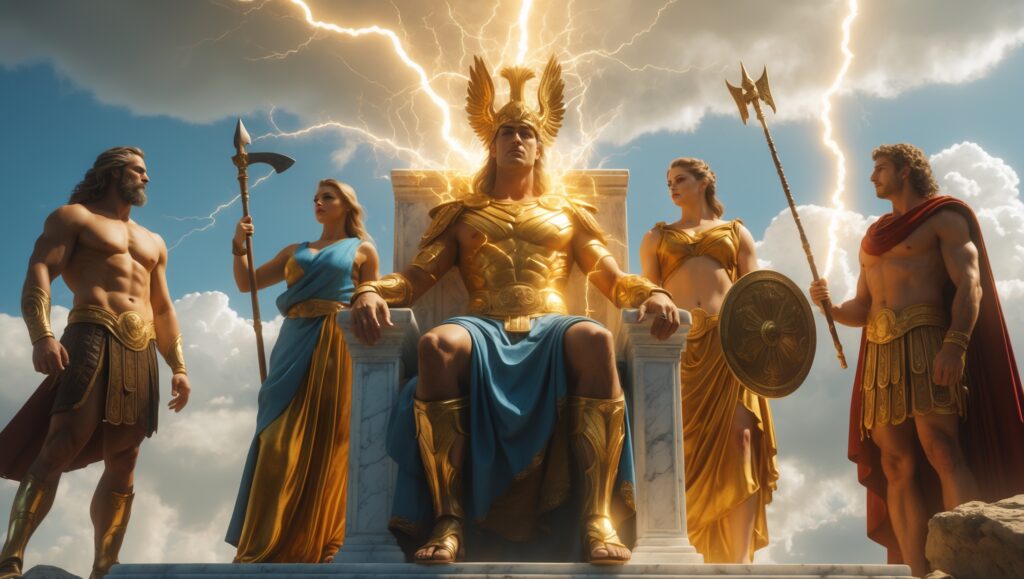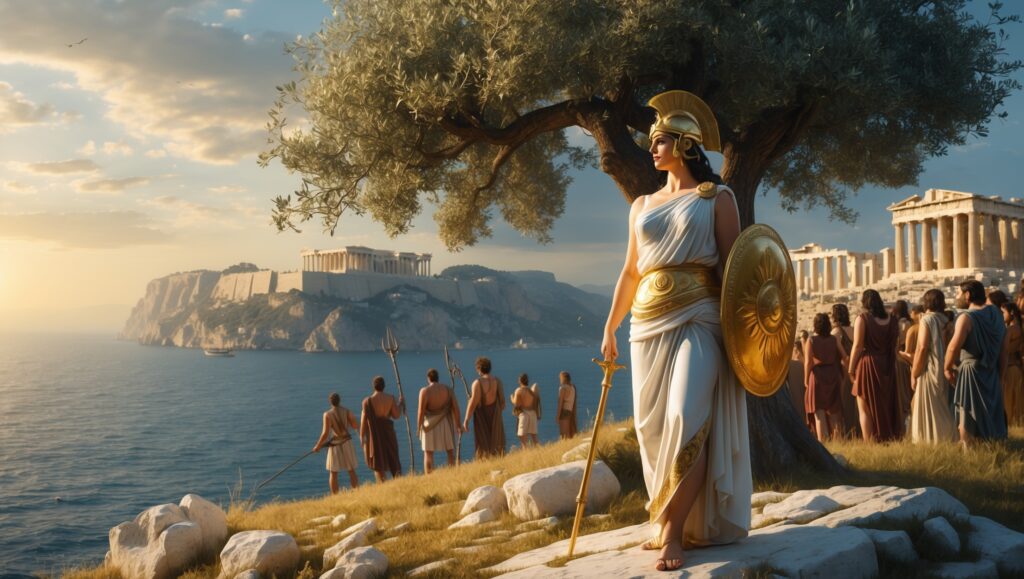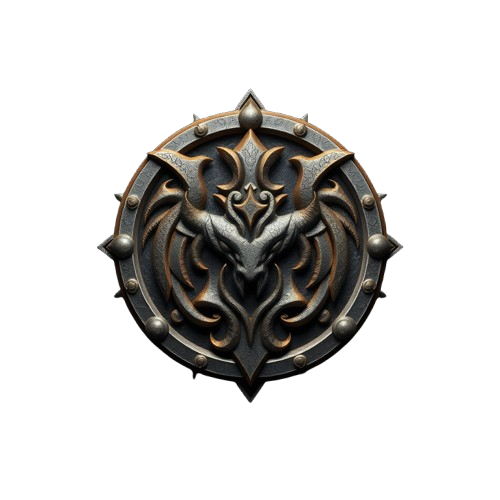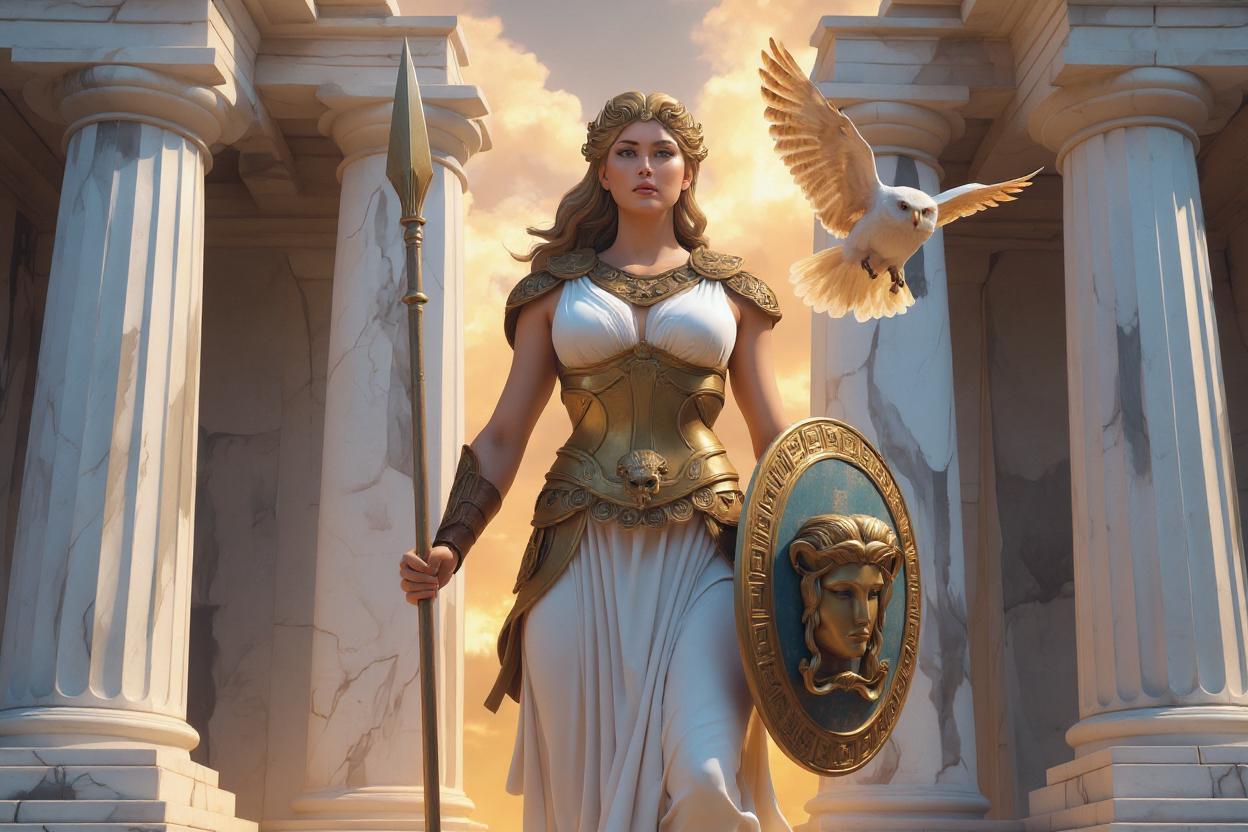In the pantheon of Greek mythology, few deities shine as brilliantly or command as much reverence as Athena. A goddess of paradoxes, she is the embodiment of both war and wisdom, of strategy and compassion, of power and grace. This is her story—a journey through myth, symbolism, and ancient reverence that continues to shape culture and imagination to this day.
Born of the Mind: The Miraculous Birth of Athena
Athena’s origin is as extraordinary as her character. Unlike other gods who were birthed in traditional ways, Athena was born fully grown and armored from the head of her father, Zeus. The story goes that Zeus, fearing a prophecy that his child would surpass him in power, swallowed his pregnant consort Metis, the goddess of wisdom. Time passed, and Zeus began suffering from an unbearable headache. When Hephaestus, the god of blacksmiths, split open his skull with an axe, out sprang Athena—radiant, wise, and battle-ready.
This miraculous birth set Athena apart immediately. She was not just a child of Zeus, but his mind’s creation, embodying intellect, courage, and justice. Her emergence in full armor symbolized her role as a warrior goddess, yet one who preferred reason over violence.
Athena and the City of Athens
Athena’s name is forever linked with the city of Athens, but few know the tale of how she became its patron deity. The city was once unnamed, and both Athena and Poseidon vied to become its divine guardian. To settle the dispute, each god offered a gift to the people. Poseidon struck the ground with his trident, producing a saltwater spring (or in some versions, a warhorse). Athena, on the other hand, offered the olive tree—a symbol of peace, prosperity, and longevity.
The citizens, or their king Cecrops in some retellings, chose Athena’s gift. The olive tree provided wood, oil, and food, securing not just immediate resources but the foundation for a sustainable civilization. As a result, the city was named Athens, and the Parthenon was built on the Acropolis to honor her.
Athena the Strategist
While Ares embodied the chaotic and brutal aspects of war, Athena represented its strategic and intellectual dimensions. She was the goddess who guided heroes, advised kings, and brought discipline to conflict. Her wisdom was not passive but actionable—she was a tactician, a planner, a master of calculated moves.
In Homer’s epics, Athena plays a vital role. In the Iliad, she supports the Greeks, especially Achilles and Odysseus, often intervening in battles with advice or divine influence. In the Odyssey, she is Odysseus’s chief protector, guiding him through trials with both wisdom and subtle manipulation. Unlike other deities who were driven by whims and vendettas, Athena’s involvement in mortal affairs was often purposeful and just.
Symbols and Iconography
Athena’s symbols are rich in meaning. The owl, a universal sign of wisdom, is her sacred bird. The olive tree speaks to her role in nurturing civilization. She is often depicted wearing a helmet and the aegis—a shield or breastplate bearing the head of Medusa, gifted by Perseus. Her spear and armor underscore her warrior aspect, but her calm demeanor and serene gaze remind us that her power lies in restraint and intelligence.
One of the most iconic representations of Athena is the massive statue by Phidias that once stood in the Parthenon. Clad in gold and ivory, the statue depicted Athena standing tall, holding Nike (Victory) in her hand, symbolizing her ability to win battles not through brute force but through wisdom.
Athena and Heroes

Athena’s legacy is inseparable from the heroes she guided. She played a pivotal role in the stories of Perseus, Heracles, and especially Odysseus.
- Perseus: Athena aided Perseus in slaying the Gorgon Medusa by gifting him a polished shield to view Medusa’s reflection without turning to stone. Her strategic mind ensured the success of this perilous quest.
- Heracles: When Heracles undertook his twelve labors, Athena was there to guide and assist, especially during the slaying of the Stymphalian birds and capturing the Ceryneian Hind.
- Odysseus: Perhaps her favorite mortal, Odysseus exemplified the qualities Athena valued most: cleverness, adaptability, and resilience. Her guidance helped him navigate the many perils he faced on his long journey home.
The Virgin Goddess
Athena is often referred to as “Pallas Athena” and is one of the three virgin goddesses of Olympus, alongside Artemis and Hestia. Her virginity is symbolic—not of purity in a moral sense, but of independence and self-mastery. She belonged to no man, and her focus was on intellectual and civic pursuits, not romantic entanglements.
This aspect of her character reinforced her status as a role model for autonomy and authority. In a pantheon where female gods often found themselves subject to the whims of male deities, Athena stood apart—respected, feared, and honored.
Athena’s Rivalries and Conflicts
Despite her wisdom and fairness, Athena was not without her rivalries. Her intellect and pride sometimes led to disputes:
- Medusa: Once a beautiful maiden and priestess in Athena’s temple, Medusa was transformed into a Gorgon after being assaulted by Poseidon in the sanctuary. Athena’s punishment of Medusa is often seen as harsh, but some interpretations suggest it was a way to protect Medusa by giving her the power to defend herself.
- Arachne: A mortal weaver who dared to challenge Athena, Arachne created a tapestry depicting the gods’ misdeeds. Though her work was flawless, Athena destroyed it in rage, and Arachne hanged herself. Out of remorse (or respect), Athena transformed her into a spider, allowing her to weave for eternity.
These myths underscore the duality of Athena’s nature—wise and just, yet uncompromising in her principles.
Athena’s Influence Beyond Greece
Athena’s influence spread far beyond ancient Greece. In Rome, she was syncretized with Minerva, a goddess of wisdom and crafts. Throughout the Renaissance and Enlightenment, Athena remained a symbol of reason, civic virtue, and the ideal state.
Her imagery has been adopted in universities, governments, and institutions dedicated to knowledge and justice. The seal of the University of Athens features her, and many sculptures around the world reflect her enduring appeal.
Athena in the Modern World
In the modern age, Athena continues to inspire. Her image appears in pop culture, novels, video games, and films. From powerful depictions in fantasy literature to strategic portrayals in boardrooms and universities, Athena’s legacy endures.
She is not just a relic of myth but a timeless symbol of intelligence in action, a guiding spirit for those who value reason over rage, discipline over chaos, and creation over destruction.
Conclusion: The Living Legacy of Athena

Athena’s myth is not just a tale of ancient times. It is a living narrative that reflects the ongoing struggle between wisdom and conflict, strategy and impulse. Her dual role as a warrior and a sage reminds us that the most enduring power is not wielded by brute force, but by the mind guided by justice.
In honoring Athena, we honor the potential for greatness within ourselves—the power to think, to act with integrity, and to rise above adversity with grace and courage.
For more interesting mythology facts visit https://www.youtube.com/@Mythoexplorers
For more interesting mythology facts visit https://www.facebook.com/profile.php?id=61577166993705
For more interesting mythology facts visit https://www.instagram.com/mythoexplorers/
To know more about Greek Mythology read the blog article https://mythfacts.blog/category/greek-mythology/

